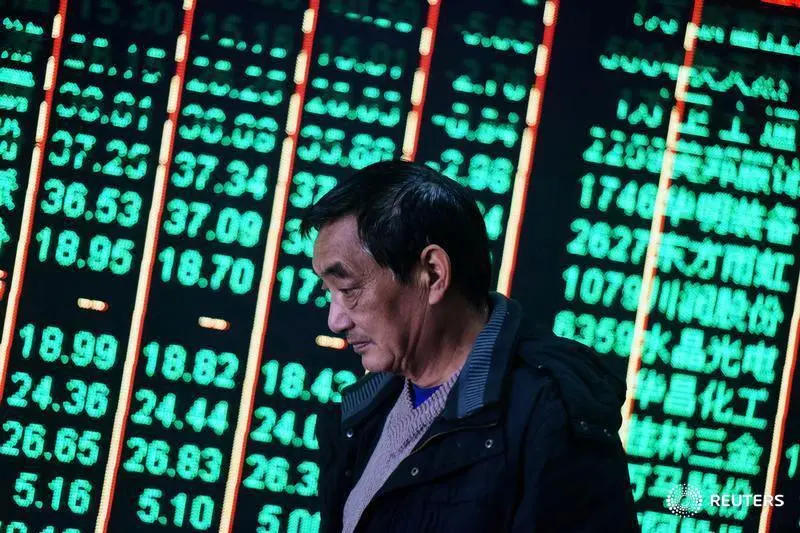PHOTO
- Asian shares trade near 14-month lows
- Saudi Arabia’s insurance shares add gains
- Oil prices gain on tightening supply
- Dollar and gold prices retreat
Global markets
Asian shares retreated early on Wednesday to trade near their lowest levels since July 2017 as trade tensions between the United States and China kept weighing on equities after American President Donald Trump on Friday threatened tariffs on a further $267 billion worth of Chinese imports.
MSCI’s broadest index of Asia-Pacific shares outside Japan lost 0.05 percent, while Tokyo's Nikkei fell 0.25 percent.
“In thinking of the prospects of the trade war, it is important to distinguish the journey from the destination. The journey will remain very noisy and unsettling. But I suspect the destination will be less so,” Mohamed A. El-Erian, Chief Economic Advisor at Allianz SE, told the Reuters Global Markets Forum on Wednesday.
Middle East markets
Saudi Arabia’s index closed 0.17 percent lower on Tuesday despite a surge in insurance shares.
Mediterranean and Gulf Insurance and Reinsurance Company (MedGulf) Saudi Arabia jumped to its daily 10 percent limit in early trading, reaching 15.2 riyals. The sector's other major gainers were Company for Cooperative Insurance, which added 5.97 percent, and Gulf Union Cooperative Insurance, which gained 4.11 percent. (click here for more info)
MedGulf’s extraordinary general meeting approved doubling the company’s capital to 800 million riyals via a rights issue for 40 million new shares, according to a statement published on Tuesday in Arabic on Tadawul.
Banking shares weighed on the index with Arab National Bank dropping 2.4 percent, Samba Financial Group down 0.9 percent and National Commercial Bank declining by 1.2 percent.
Dubai’s index dropped 0.58 percent, as Emirates NBD and Emaar Properties dipped 1 percent and 0.9 percent respectively.
Abu Dhabi’s index added 0.1 percent, as First Abu Dhabi Bank reversed an early slump to close 0.3 percent up while Abu Dhabi Commercial Bank rose 1.7 percent.
Qatar's index firmed by 0.4 percent, as Masraf Al Rayan rose by 1.7 percent and Qatar Islamic Bank closed with a 1 percent gain.
Oil prices
Oil prices added gains early on Wednesday as the American Petroleum Institute (API) said on Tuesday that U.S. crude stocks fell by 8.6 million barrels in the week to September 7 to 395.9 million barrels.
The market also was pricing in new U.S. sanctions on Iran starting November, which also pushed prices higher.
U.S. West Texas Intermediate (WTI) crude futures were at $69.81 per barrel at 0047 GMT, up 56 cents, or 0.8 percent, from their last settlement.
Brent crude futures climbed 24 cents, or 0.3 percent, to $79.30 a barrel.
“Oil prices jumped overnight as American Petroleum Institute inventory data showed a large drawdown in inventories,” William O’Loughlin, investment analyst at Australia’s Rivkin Securities, told Reuters.
Currencies
The dollar retreated early on Wednesday. The greenback’s index against a basket of six major currencies edged down 0.1 percent, but stayed near strong figures.
The euro was down 0.1 percent at $1.1595, while the pound also shed 0.1 percent to $1.3017.
Precious metals
Gold prices retreated on a strong dollar.
Spot gold was down 0.1 percent at $1,196.21 an ounce at 0102 GMT, after hitting its lowest since Aug. 24 at $1,187.21 on Tuesday.
U.S. gold futures were mostly steady at $1,202.40 an ounce.
(Writing by Gerard Aoun; Editing by Shane McGinley)
(gerard.aoun@thomsonreuters.com)
Gain a deeper understanding of financial markets through Thomson Reuters Eikon.
Our Standards: The Thomson Reuters Trust Principles
Disclaimer: This article is provided for informational purposes only. The content does not provide tax, legal or investment advice or opinion regarding the suitability, value or profitability of any particular security, portfolio or investment strategy. Read our full disclaimer policy here.
© ZAWYA 2018





















